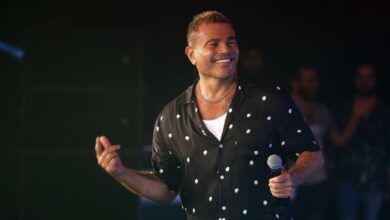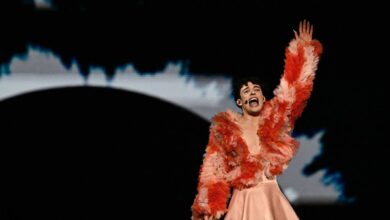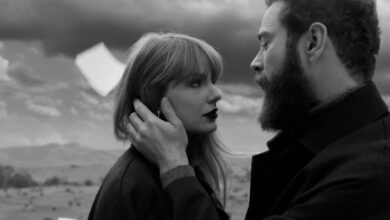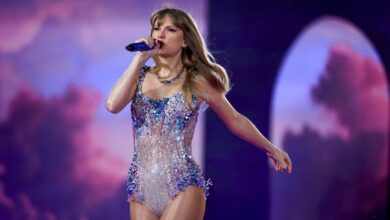Prominent Egyptian Maestro Sherif Mohie ElDin is currently working on his new opera El Saqamat, based on a novel by the late writer Yussef El Sibai, after the thrilling success of Miramar, his last opera which was based on the work of Naguib Mahfouz
Mohie ElDin studied the Corno (horn) at the age of 14 at the Cairo Conservatoire, and later specialized in composing and conducting. He works with a European Egyptian orchestra, combining music with poetry and other rich Arabic literary texts. Mohie ElDin was artistic director and principal conductor of the Cairo Opera House Orchestra from 1997 to 2002, and then moved to head the Bibliotheca Alexandrina Arts Center.
Walking into Sherif Mohie ElDin’s office is like walking into an art museum. The corridor leading to his office at the heart of the spectacular plaza in the Bibliotheca Alexandrina is lined with large fine art paintings. His spacious office is decorated with another collection of the fine artworks, a mix of statues, old street signs, caricatures, and masterpieces by Hassan Suliman, Saif Wanly, Ragheb Ayad, Samir Rafei, el-Razaz, Kanaan and others. There is also a thrilling collection of classical and modern music CDs. A quick look at his bookshelves reveals a deep interest in cinema, literature, architecture and philosophy. His main office is an interesting design, with an old sewing machine and fine metal work. All of which are his personal belongings.
In this stunning location, Al-Masry Al-Youm met the busy composer, conductor and head of the arts center.
Al-Masry Al-Youm: You have very broad artistic interests. Why is that?
Sherif Mohie ElDin: I come from a very artistic family. My father is a painter, Mohie ElDin Hussein, and I was raised in a very nice old house in the old Haraneya district in Giza. Our house was a beautiful design and had a large garden. Growing up in artistic surroundings is not like living in a tall modern building. I used to see a wide range of intellectuals who gathered at our house every Friday. My job here as an arts center director requires a broad interest in all forms of culture, not only those that I am specialized in.
Al-Masry: Do you think that there is a link that connects all arts together?
Mohie ElDin: Certainly, I believe that every form of art has its own music, or rhythm. In fiction there is a difference between Naguib Mahfouz’s style and that of Ehsan Abdel Qudos. The difference is not a linguistic one, but rather in the pace or rhythm that each of them maintains. The same applies to paintings. The relationship between volume and empty spaces, all of this is music. Even management is a form of art – and I believe I have this talent!
Al-Masry: Was it a difficult decision for you, after being the head of Cairo Opera Orchestra and conducting concerts, to be sitting in an office and managing a different kind of work?
Mohie ElDin: I thought that in my position here I can serve the arts more. Also, in terms of music, for all sorts of reasons I am not as productive as I used to be. It is not like I wake up every day and start writing music. Part of it is physical and the other part is related to the way I compose. Also this is not just an office – look at the spectacular scene I can see from my office. And you see how my colleagues here are really lively and energetic. So it is a lovely working environment.
Al-Masry: You experimented a lot with music and it seems your favor combining literature with opera. You have done that with Yussef Idris’s stories, and with poets such as Amal Donqol. Is this a difficult formula?
Mohie ElDin: I don’t choose difficult texts. I chose three short stories by Youssef Edris. All of them are easy to read and the scenes are set indoors. I didn’t do a big historical opera, for example. When I pick Arabic texts I prefer simple Arabic, as in Amal Donqol’s poetry. It has its own music.
Al-Masry: You have also worked a lot with the Egyptian poet Sayed Hegab.
Mohie ElDin: History is full of pairings between artists, and for many reasons Sayed Hegab is mine. We just click. Although he is not very punctual and I have to wait for him to get inspired, it just works between us. We complete each other’s music.
Al-Masry: You were interested in electronic music for a while, are you going to do more of that?
Mohie ElDin: It was a phase between 1988 and 1989, the outcome of a collaboration between me and my friend Amr Abu Zekri. We did a concert at the opening of the Bibliotheca Alexandrina. I am continually experimenting with music. Sounds are like colours, they are everywhere and can be used in a lot of ways. It depends on how you look at them. It doesn’t matter if those sounds are from nature or not, what matters is what you do with them.
Al-Masry: How do you work? How do you compose?
Mohie ElDin: I am always working. I am always constructing music in my head. But I don’t write until the music is complete.
Al-Masry: Do you mean the general outline, or the details and the arrangement of the music?
Mohie ElDin: Everything, I hear the complete piece with the different solos, the instruments and everything. I might change minor details as I am working, but it is pretty much complete and visual in my head.
Al-Masry: You traveled a lot and studied in Germany, France and the United States. How did this affect you?
Mohie ElDin: I traveled a lot, but never stayed outside Egypt for more than a year. Which is exceptional for me, because everyone I know, including my sister and my ex-wife, has stayed abroad for more than five years to study music. I studied here in Egypt, and every now and then I travel to do some polishing up and then I return. I studied conducting in France, but I was already a conductor in Cairo. I took a higher diploma there, and I did two semesters in Germany with a very good German tutor in composition. The reason why I was intrigued to study with this particular tutor is because he works in a way that is the opposite of how I was taught by my tutor Gamal Abdel Rehim, and I learned to add new elements to my work. It was a great opportunity.
Al-Masry: You composed a new introduction for Beethoven’s ninth symphony. Was that challenging?
Mohie ElDin: No, that was very easy. What can be more inspiring than Beethoven? I just imagined that I was Beethoven writing the music now, so I used some Egyptian instruments and lines in the music. I changed the chorus but I used the same music. It was so much fun.
Al-Masry: You are fond of mixing oriental and western music in an unusual way in operas and orchestras.
Mohie ElDin: My job is to put those two together. Each of them has its own characteristics. What is most important to me is the structure. I have a fresh new melody and lively rhythm and traditional twist, which I call traditional because the term ‘oriental’ can feel like a stereotype. I am an Egyptian writing with a European technique. So it is only natural that you find this mix.
Al-Masry: How do you feel about the current cultural situation in Egypt? Do you feel that we are facing a crisis and that the golden age has gone?
Mohie ElDin: No, there are people that have a constant unhealthy nostalgia for the past and I am not one of them. I am against nostalgia because it is against art. You can see it everywhere. There is an artist whose voice is similar to the famous composer and singer Abdel Wahab, who physically looks like him and who sings his songs – what is that? Another one looks exactly like the late singer Abdel Halim Hafiz. So the audience comes to see Abdel Halim and listen to Abdel Halim in their heads, and they applaud him. It is so funny, people go to theaters with their own music. It’s like a puppet show. There is a difference between artists and theorists. Artists are like a blank piece of paper, always ready to receive new things. They don’t judge before seeing and absorbing.




